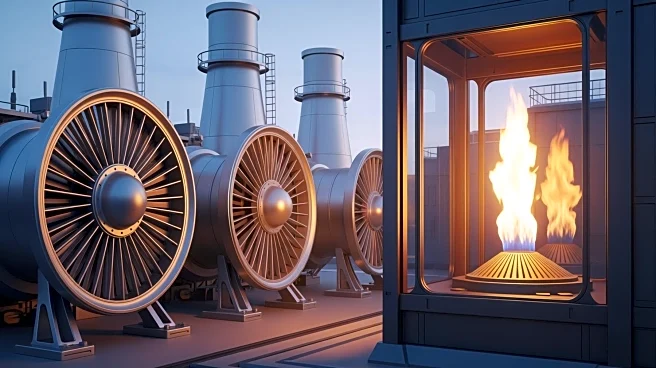What's Happening?
Arbor Energy, a company founded by former SpaceX engineers, has announced a significant shift in its power plant operations. Originally designed to remove carbon dioxide from the atmosphere by burning plant waste, the power plant will now also utilize
natural gas. This change comes as a response to the increasing electricity demand from data centers, which the original biomass-only design could not fully support. The company has raised $55 million in a Series A funding round led by Lowercarbon Capital and Voyager Ventures to support this transition. Arbor Energy plans to continue capturing CO2 emissions using oxy-combustion technology, which allows for easier sequestration of carbon dioxide. The company is also working with natural gas providers certified for low leakage rates to minimize the environmental impact.
Why It's Important?
The expansion of Arbor Energy's power plant capabilities to include natural gas highlights the ongoing challenges and trade-offs in the transition to cleaner energy sources. While the use of natural gas can help meet growing energy demands, it also raises concerns about methane emissions, a potent greenhouse gas. Arbor's commitment to capturing CO2 emissions and working with low-leakage natural gas providers is crucial in mitigating these environmental impacts. This development reflects broader industry trends where companies are seeking to balance energy needs with environmental responsibilities. The success of such initiatives could influence future energy policies and investments, particularly in the context of data center energy consumption and carbon capture technologies.
What's Next?
Arbor Energy is in the process of constructing a power plant in Louisiana, which will primarily burn biomass. This project is partially funded by a $41 million deal with Frontier, an advanced market commitment supported by companies like Stripe and Google. Under this agreement, Arbor is tasked with removing 116,000 tons of carbon dioxide by 2030. The company's future actions will likely focus on optimizing the integration of natural gas while maintaining low carbon emissions. Stakeholders, including environmental groups and energy regulators, will be closely monitoring Arbor's progress and its impact on carbon capture technology advancements.















